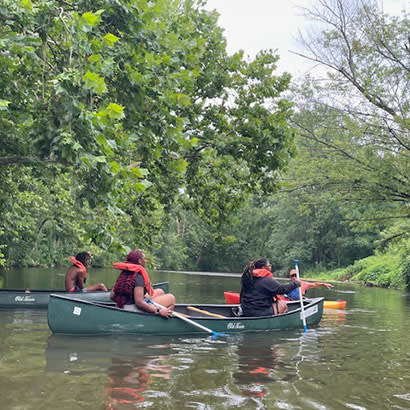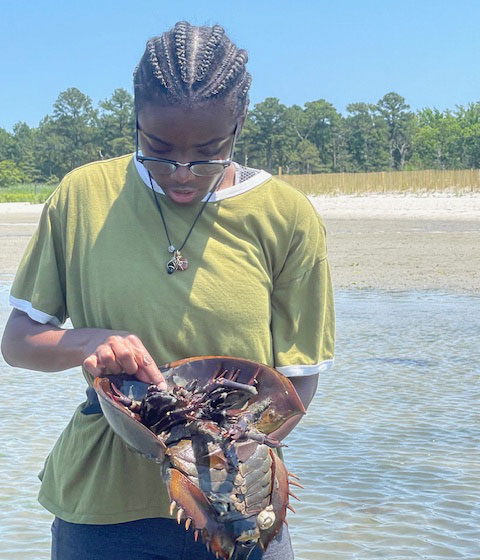
Pictured: Participants in the City of Wilmington’s Green Jobs Program canoe on the Brandywine River. Photo Credit: Martha Corrozi Narvaez
It’s a hot day in early August and 14 teenagers are about to push off the banks of the Brandywine River to paddle from the headwaters in Pennsylvania downstream to Wilmington, Delaware. The day begins with a bit of fear and hesitation from first-timers. That fear is soon overpowered by laughing, splashing and an all-around fun day in a natural space that just happens to be the City of Wilmington’s drinking water source. This is just one of the many activities for youth participating in the City of Wilmington’s Green Jobs Program. The program, in its 14th year, brings Wilmington’s urban youth outside and exposes them to environmental issues and careers while helping to transform the city into a greener, cleaner, safer community.
Since 2011, the City of Wilmington’s Department of Parks and Recreation and the University of Delaware’s Water Resources Center (UDWRC) have partnered to lead the city’s Green Jobs Program. Through the City’s Department of Parks and Recreation’s Youth Career Development Program, the City administers the program and the UDWRC establishes and oversees the 6 weeks of programming. Participants must be 14-18 years old and through an application and interview process, 14 interns are selected. The program commences in late June and youth work 25 hours/week (for six weeks) and earn minimum wage.
The City of Wilmington is located at the confluence of the Brandywine Creek and Christina River, a short drive from the Delaware Bay, and about 90 miles from the Atlantic Ocean. The geography of the city and its surroundings provide an ideal teaching ground for topics such as watersheds, estuaries, climate change and nonpoint source pollution — and these are key concepts of the summer’s programming. The interns have opportunities to get their feet wet in the local rivers and survey mussels, explore the bays and discover horseshoe crabs, search for aquatic life such as macroinvertebrates, sample water quality, and fish and canoe in outdoor spaces that many have never experienced just outside their schools and homes.
Although there is a strong emphasis on water resources, water isn’t the only focus of this program. Key environmental topics — including climate change, environmental justice, invasive species, agriculture, horticulture, gardening and individual environmental impact — are critical components of the programming. Additionally, throughout the program, the youth are developing professional skills and learning about environmental careers and research at nearby universities and colleges.

Pictured: A participant in the Green Jobs Program studies a horseshoe crab. Photo Credit: Martha Corrozi Narvaez
A key to the success of this program is the program hosts, which include nonprofit, government (local and state), and private and academic entities. The project partners host the interns for a range of days throughout the six-week program and expose them to natural spaces, research, environmental careers and issues through a variety of activities The organizations that host the youth work hard to make sure the interns exit the six-week program with a greater understanding of the environment, how they may become involved in improving their local environment and their individual impacts on the environment.
In early August, the youth come together for what is often considered a highlight of the program — the closing ceremony. Over the six weeks, the interns work together in teams to prepare presentations for the final event celebration. Invited guests include representatives and leaders from the City of Wilmington’s Department of Parks and Recreation, state and local dignitaries, host organizations, and the interns’ families and friends. The interns present their experience and what they have learned throughout the program. Each presentation is filled with photos reflecting their experiences and provides a unique portrayal of each intern’s journey over the six weeks. Every year, the program has received strong support from the city’s mayor, and the interns receive a certificate of completion for their participation in the program.
In a recent Green Jobs Program Impact Study, the program received positive feedback from the participants. More than 188 youth have participated in the program in more than 14 years. For most participants, this is their first paid work experience. In the annual program evaluations, all the participants note they would recommend the program to a friend and that they gained a better understanding of the environment and environmental careers. Each year the interns most enjoy the canoeing experience. Many of the youth have never had the experience of paddling a canoe, and that feeling of excitement and trepidation of getting into that wobbly vessel for the first time is unforgettable. The idea is that this is just the beginning of their adventures on the waters — and the beginning of an overall appreciation for the environment.
Research suggests that today’s youth may understand the threats to the environment on a global scale, but their connection to their local environment and understanding of their role in it is diminishing over time. Broader environmental concepts are taught, but the value of a personal experience in one’s local environment is often overlooked or neglected. Focusing on getting youth outside and touching, feeling and seeing what’s in their neighborhood and backyard can make great strides to awakening an appreciation for and connection to the outdoors and the environment.
Wilmington’s Green Jobs Program is centered on the environmental field and helping to improve the environment, but many learned skills are applicable in any field in which the interns choose to work in the future. We hope that this program will continue to be a hallmark program of the city and will continue to expand young minds, encourage positive environmental behavior, and enhance the senses of the City of Wilmington’s youth.
Interested in learning more about workforce development alongside peer park and recreation agencies? Check out NRPA’s Workforce Development Community of Practice. Applications are open through March 24!
Martha Corrozi Narvaez is Associate Director of the Institute for Public Administration's Water Resources Center at the University of Delaware. As Associate Director with UD’s Water Resources Center Martha is responsible for providing regional watershed technical, policy, education, and research support to state and local governments; University of Delaware staff, students, and faculty; and nonprofit organizations in Delaware and the Delaware Valley. Martha has over 20 years experience in the water resources field and received her Bachelor of Science (B.S.) in Biology from Lehigh University and her Master of Public Administration (M.P.A.) degree from the University of Delaware where she specialized in watershed management.
This blog post is part of a multi-part virtual learning series highlighting park and recreation workforce development programs across the country. For more stories like this, check out the following blog posts:
- Recreation as a Gateway to Youth Workforce Development
- Empowering At-Risk Youth Through Workforce Development in Recreation
- Sowing Seeds of Stewardship: Cultivating Youth Conservation Leaders in Taos, New Mexico
- Five Ways to Expand Accessibility in Outdoor Workforce Development
- Mastering Essential Skills in Park and Recreation-Based Workforce Development
- How the Outdoors Paves a Path for Youth Workforce Development


